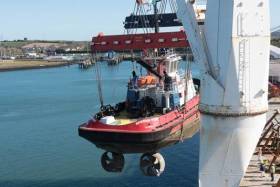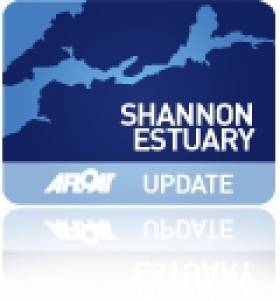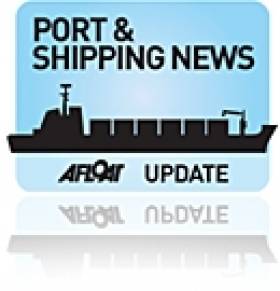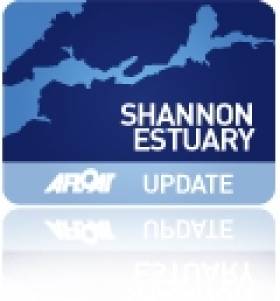Displaying items by tag: Celtic Tugs
Cork Harbour Company Celtic Tugs Purchases New Tug
Cork shipping company Celtic Tugs, a subsidiary of Irish Mainport Holdings, have purchased a new Tug which arrived into Ringaskiddy Deepwater Berth in the Port of Cork on 31st March. The new tug is expected to rejuvenate the company’s existing fleet of three tugs already owned and in operation by Celtic Tugs.
Currently named ‘Efesan Port’, initially registered in August 2015 under the Turkish flag, the new tug will be renamed in the coming days to ‘Celtic Fergus’ and will operate under an Irish flag.
The 24/45tbp tug was designed & modified by well-known Canadian designer Robert Allan Ltd and have a pair of CAT 3512 high speed diesel engines driving Schottel SRP 1012 FP propellers. The tug is able to serve as a fire fighting vessel with the help of an engine driven firefighting pump. In addition to frequency controlled electrical driven fore towing anchor winch, the vessels are fitted with aft towing winches and rescue boat crane for long distance towage. The vessel is able to accommodate 6 crew on board if necessary.
Speaking about the new purchase, Dermot Curtin Fleet Director Irish Mainport Holdings said: “The Tug has been purchased as part of Celtic Tugs long term plans to rejuvenate the present fleet of 3 tugs and shows our commitment and dedication to our current clients and contracts. The ‘Celtic Fergus’ will replace the ‘Celtic Banner’ which has served flawlessly in the Shannon Foynes Port area for the last 16 years.”
He continued: “Celtic Tugs is the largest privately owned port towage and salvage fleet operator in Ireland and since the company’s inception it has provided towage services to clients not just in Shannon and Cork harbour, but also on the coast by way of contract towage and salvage. We are looking forward to introducing ‘Celtic Fergus’ to our fleet and putting it into operation.”
Foynes Hosts Emergency Ship Fire Drills
#SHANNON ESTUARY – The Maritime Journal reports that a simulated fire and rescue drill simulating a fire on board a ship took place in Foynes Port this week.
Limerick County Fire & Rescue Service with the assistance of Shannon Foynes Port Company and Celtic Tugs which operates a fleet of tugs in the port hosted the Ship and Ports Course.
A number of exercises were carried out during the course, to read more on the exercise click HERE.
On board the 60m vessel there is an aft clear working deck space used for supplies which is capable of handling two 20ft reefer containers and a single 20ft storage container. The vessels' powerplant is provided by 2 x Caterpillar 3516B main-engines of 1920kW (5150bhp) at 1500 rpm which drive twin kort nozzles propellers and equipped with a corresponding pair of high-lift rudders.
Accommodation is for 42 berths (11 for officers and crew) and other marine personnel (numbering 31) in addition to two hospital berths. All of the cabins are air-conditioned with washrooms/WC.
Dina Alliance brings the Mainport Group fleet total to 24 vessels (for list click HERE) which are deployed in various sectors engaged in offshore support vessels covering safety standby, tugs, tanker assist, towage, bunkering and seismic support services.
Earlier this year the company's Foynes based tug Celtic Isle was requested to assist in refloating the stricken combi-heavy lift vessel Pantanel which had dragged its anchor in stormy seas after running aground in Cashla Bay, Rossaveal. The German-owned vessel was to load two former Aran Direct owned fast-ferries that operated from the Connemara harbour on a delivery voyage bound for Mauritius.
Mainport is a Cork based operation with offices located in Foynes, Limerick, Drogheda in addition to operations overseas in Durban and Johannesburg in South Africa and Aktau in Kazakhstan.
- Celtic Tugs
- Ports and Shipping News
- Aran Islands
- Aran Direct
- Rossaveal
- Island News
- North Sea
- Mauritius
- Mainport Group
- Cashla Bay
- Celtic Isle
- Dian Alliance
- Anchor handling tug supply
- AHTS
- Aran Islands fast ferries
- Pantanel
- Combicarrier Pantanel
- Mauritus
- shipgrounding Cashla Bay
- Supply Seismic Support Vessel
- North Sea energy reserves
- Dina Alliance
Bulker Becomes Largest Vessel to dock at Foynes
The 61,000 dwt bulker Sibulk Prosperity became the largest ship to date to dock at Shannon Foynes recently according to The Limerick Leader.
The Panamanian registered vessel carrying a cargo from Santo in Brazil. At 200 meters long and a draft of 10.5 meters, the vessel delivered a cargo of 22,000 tonnes and took 3 days to discharge its cargo of animal feed. The discharge rate was 1,100 per hour for her time in port. Limerick based ship agents Mullock & Sons provided stevedoring services.
Tim Egan, manager of Mullocks & Sons Shipbroking in Foynes said 'Ships that usually come into Foynes would be about 35,000 dwt. This is almost double that but the challenge isn't her size but her length. The way they are building ships these days, it nearly double the dead weight but is the same depth in the water. She will have to turn around in the Estuary to get out when she leave the port'.
Mr Egan commented that 'two years ago the Port Company of Shannon Foynes invested in a dredging vessel which has allowed super-sized cargo ships to get in and out of the port with greater ease. The dredging and ploughing has kept a depth in the Channel which makes it a lot easier'.
The Sibulk Properity departed Foynes with the assistance of Celtic Tugs based in Foynes.



























































